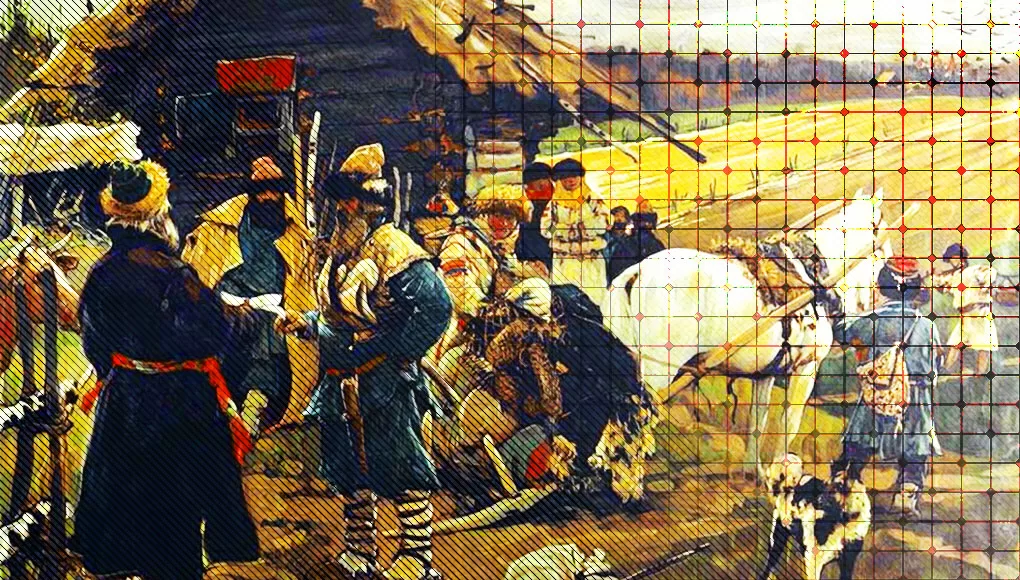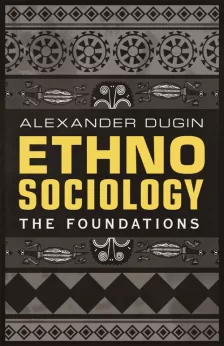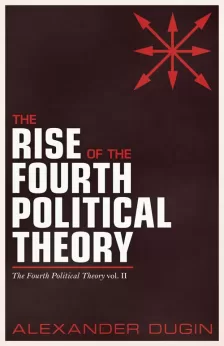Section One: A Brief Excursus into Classical Sociology
The Basic Concepts of Sociology: The General and the Particular
Ethnosociology studies the ethnos with the help of the sociological apparatus, and for that reason we will need the basic concepts of the discipline of sociology. We shall now make a short excursus into the fundamentals of sociology.
Sociology is a discipline that examines society as a whole preceding its parts, as an organic, not a mechanical phenomenon; it is a discipline that emphasizes the common, or the social, and not the particular, or the individual. Psychology concerns itself with the person. Sociology, on the other hand, studies society as a whole. The fundamental principle of sociology can be summed up thus: the particular derives from the common.
Social Strata and Groups
The fundamental framework of sociological knowledge are two axes, x and y, on which are arranged social strata (x-axis) and social groups (y-axis).

Figure 1. The basic model of sociology.
Of course, sociology is a well-established scientific discipline. It has many theories, concepts, and methods for the study of society, but the fundamental meaning, scientific paradigm, and episteme of sociology can be reduced down to this very simple diagram.1
A person’s position with respect to these two axes determines his status. Status consists in a set of roles.
The y-axis, on which strata or classes (understood sociologically) are arranged is called the axis of social stratification. From the sociological point of view, strata are primary in relation to other forms. On the x-axis, social groups are arranged. This is the amalgamation of people by markers of their belonging to a profession, gender, age, geographic area, ethnicity, or administrative position, drawn up in accordance with a non-hierarchical principle. Strata, for their part, imply a hierarchy.
The superimposition of these two axes provides a basic representation of the structure of a society and the place of any unit in it taken for consideration, whether collective or individual. Each social phenomenon, institution, and personality can be resolved into its components through these axes. Such resolution is sociological analysis, the main professional activity of the sociologist.
Sociology operates with the concept of inequality, the quantitative indicator of which is placed along the y-axis. The qualitative indicator is marked on the x-axis: belonging to one or another social group or to a few groups at once.
The strata define a social hierarchy, for which reason the y-axis is vertical. In themselves, groups do not yet say anything about a higher or lower position, which is why the axis on which they are arranged is horizontal. The fact that someone belongs to the group of pensioners, Orthodox Christians, or Muslims in no way makes a pensioner or a Christian higher or lower than one another. Hence groups are arranged horizontally or are at times superimposed on one another. Someone can be a pensioner or a Christian or both one and the other at the same time.
From the point of view of strata, a person can be either a rich, educated, and famous director, or a subordinate, poor, undereducated, and entirely unknown local. By a certain relativity of approach, society as a whole can be mapped onto this scale of stratification. Sociologists usually distinguish between three main classes: the upper, the middle, and the lower. Membership in each of them is evaluated according to entirely precise criteria: one’s income, number of subordinates, years of education, academic level, and index of citations. A man who has thirty dollars in his pocket and sees a poor person begging might consider himself to be ‘rich,’ but the sociologist will swiftly return him to reality if he asks about his monthly income. The same principle applies to renown: it might seem to someone that he is ‘famous’ if he is known by two or three groups of his peers and he enjoys success among them, but a measurement of the index of citations will put him in his place if it proves that there is no mention of this person among relevant sources.
Metaphor of the Theater
From the point of view of sociology, man is nothing other than his status or the totality of statuses, a status-set. Contained within the status is a set of roles. The totality of statuses, the carrier of which is the same individual, is a totality of role-sets. For that reason, the metaphor of the theater lies at the basis of the sociological method. In Shakespeare’s words: ‘All the world’s a stage, / And all the men and women merely players.’ The personal life of the actor does not exist. The actor lives in his roles. These roles can vary. The same actor can play the villain or the hero, a love-struck youth or a greedy loan shark. That which lies beneath the mask, beyond the limits of the stage, normally interests neither the theater, nor the audience, nor the producers.
It is exactly the same thing in sociology. The sociologist studies roles and whether they are played well or not. The question ‘By whom are they played?’ does not interest him. In any girl, for instance, the sociologist sees an actor and her ability to cope with the roles of beloved, wife, bride, mother, daughter, secretary, future scientist, gymnast, swimmer, cook, etc. In other words, the sociologist sees in a person a set of social statuses.

Figure 2. Status in the sociological coordinate axes.
Man as a Derivative from Society
From a sociological point of view, a person is a derivative of the two axes. The essence of the sociological person is defined depending on where on the diagram we put the dot. In sociology, status prevails over personal qualities.
The person is derived because, being a set of statuses, he does not himself create it. He takes it over. He is inscribed into it. It is always created by something else.
In sociology, the person is a product, a result, a detail in an enormous construction. He does not write the drama, nor is he the director. He merely plays roles, which someone else always writes. The person does not build the theater. The theater is unquestionably built: it is called ‘society.’ Sociology does not set before itself the task of discovering the originator of society. This is too abstract and philosophical a question. There is an obvious fact: when we look at history, when we deal with people, we always see society. We come across it everywhere — in archaic, primitive, and highly-developed peoples. Furthermore, society is always built up on collective, super-individual foundations. Everywhere — both in very complex and in very primitive societies — there exist strata and groups.
Who invented society? Sociologists do not know and do not ask this question. Society is absolute. Society always was, and it was always primary in relation to the person. The person is a product of society, a sociological convention. A person outside of society does not exist as a phenomenon. We know a person only as a social person, i.e., as the bearer of social statuses.
Taking this fundamental principle into consideration, we begin to study the ‘ethnos.’
Section Two: Introducing the Concept of ‘Ethnos’
The Etymology of the Word ‘Ethnos’ and its Synonyms
Ethnos (ἔθνος) is a Greek word meaning ‘people,’ along with other Greek synonyms, such as γένος (génos), φυλή (phylé), δῆμος (démos), and λαός (laós), all of which have certain semantic nuances.
Ethnos is another name for the narod, which gradually became a scientific term.2 The Greek word éthnos is close to the Russian word этос (etos), from which the concept of ‘ethics’ is formed. Этос means ‘disposition,’ ‘behavior,’ ‘morality.’ Ethics is a semantic synonym of morals. The archaic Greek root ἔθ (éth-), from which both the words ethnos and ethos are both descended, meant a populated locale, ‘a locale in which villages or settlements are found,’ or ‘rural settlement,’ but not ‘city,’ inasmuch as the city is a πόλις, a polis, from which the term ‘politics’ is derived.
Thus, in the concept of ethnos there is combined a spatial notion of a populated (rural) country (ἔθ), the concept of ‘disposition,’ ‘morality’ and ‘custom’ (ἔθος) just as it is in the meaning of narod (ethnos). The ethnos is an organic society, located on a defined territory and distinguished by a common morality.
A society can be varied: from the intricate (complex) to the simple (primitive). The ethnos is a simple society, organically (naturally) associated with a territory and bound together by common morality, customs, and symbolic systems.
Definition of the Ethnos
In Russian, the term ‘ethnos’ was introduced into scientific use by Sergei Mikhailovich Shirokogoroff (1887–1939), the great Russian ethnologist, founder of Russian Ethnology, who influenced the Russian historian, ethnologist and Eurasianist Lev Nikolaevich Gumilev (1912–1992).
This is how Shirokogoroff defined an ethnos:
An ethnos is a group of people who (1) Speak the same language, (2) Acknowledge their single origin, (3) Possess a complex of customs, ways of life, and preserved and sanctified by tradition, differing from the customs of other groups.3
The criterion of customs, sanctified by tradition and differing from other groups, very evidently points to the ethos. That is, the presence of specific traditions, customs, and mores comprises one of the main definitions of an ethnos. Thus, a moral basis is one of the essential aspects of an ethnos, which is based on a unity of mores, on the synchronism of moral valuations.
Let us recall Friedrich Nietzsche’s (1844–1900) wonderful observation in his book The Genealogy of Morals, wherein he draws attention to the extent to which the mores of different peoples differ from one another.4 For Christian ethnoses there are truths such as ‘love your neighbor’ and ‘do not murder.’ But for the Iranians, for example, the understanding of what is ethical is expressed differently: ‘it is good to shoot with a bow and to speak the truth.’ That is to say: different ethnoses have different ethoses.
In Shirokogoroff’s definition, the complex of customs, way of life, and traditions that characterize a given ethnos necessarily differ from those of other ethnoses. In the very definition of ethnos and ethos there is contained the idea of a plurality of ethnoses and a plurality of ethoses, mores and morals. For that reason, the expression ‘universal ethnos’ is deprived of any sense, since it has nothing to oppose to it. There is no universal ethnos. The ethnos is always concrete.
One can speak of a global socium as an artificial sociological and political construction, but it is not possible to speak of a global ethnos. It is theoretically possible to imagine a socium as something global and universal, but an ethnos is always concrete and particular. At the center of the ethnos, as at the center of morality, there always lies the assertion of a specific system of values.
Unity of language is another qualitative feature of the ethnos. People, speaking one language, living in the same system of signs, senses, and meanings, delineate a specific terrain in the sphere of ideas, mores, psychology, and social relations, which unites them and integrates them along a cultural trait. The ethnos thereby creates a spiritual world, all the participants of which dwell in a shared space of meaning.
There is such a phrase as ‘the Russian world.’ It describes the borders within which communication in the Russian tongue is possible. Language, as Martin Heidegger said, is ‘the house of being.’5 And this house is always ethnic. Language, the commonality of language, constitutes the unity of a common terrain in the sphere of the spirit. It is not important whether this terrain belongs to one or two countries, or whether political or religious borders lie between ethnoses. If people speak and think in one language, then they find themselves in the space of that ethnos to which the language belongs.
Shirokogoroff spoke of the acknowledgement by an ethnos of its single origin. Does a community of people have a single origin or not? From the point of view of sociology and history this is a very difficult question, because almost always peoples, ethnic cultures and traditions turn to the theme of their mythical origins. Plato, for instance, considered himself a descendant of the god Poseidon.
At the source of an ethnos there always lies myth. For instance, Tibetans think that their ancestors were red monkeys and for this reason Tibetans are those who consider themselves descendants of red monkeys.6 Each people has its first-ancestors in culture, and what is important is not whether this ancestor in fact existed or not: nobody knows. Something else is important: how, with what degree of intensity, the ethnos is aware of and experiences its common origin (be it purely mythological). Many who call themselves ethnically ‘Russian’ are representatives of other (most often indigenous) peoples of the Russian Empire, and this ‘Russianness’ forms an ethnos together with the Russian language and a sense of belonging to Russian culture.
Reverences
1 See Kravchenko, S. A. Sociology: Paradigms and Themes. Moscow: 1997.
2 TN: I often transliterate the Russian term ‘narod’ into English as a technical term.
3 Shirokogoroff, S. M. Ethnos: A Study of the Basic Principles of Change of Ethnic and Ethnographic Phenomena. Shanghai: 1923.
4 Nietzsche, F. Genealogy of Morals. Moscow: Azbuka, 2007.
5 Heidegger, M. Elucidations of Holderlin’s Poetry. SPB: Academic Project, 2003.
6 Kychanov E.I. & Melnichenko, B.I. The History of Tibet from Ancient Times to Today. Moscow: Vost. Lit, 2005.










Most interesting. This indicates how important Dugin’s work is. Contrary to the near monopoly of sociology by the Left, there is a sociology of the Right (despite Dugin’s own disavowal of Left and Right) that has many foundations from which to proceed. This essay is a good example.